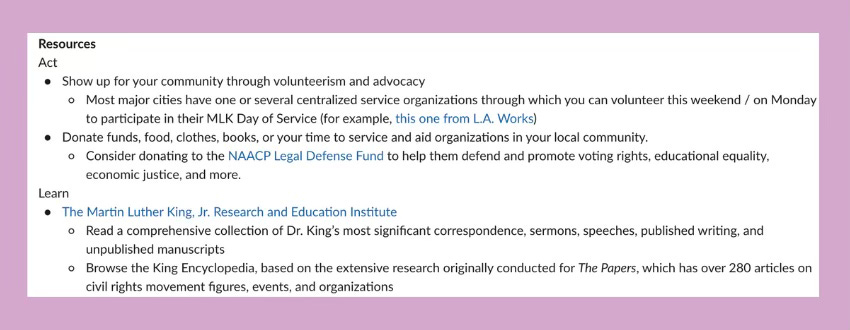What your paid holiday policy says about your company culture
Why contextualizing your employee benefits matters
CHERRY ON TOP 🍒 is our monthly newsletter exploring the ins and outs of everything that modern businesses need to truly shine. We dive into topics that live at the intersection of our two companies – ORCHARD STREET, a seed fund & DALY, a comms+ agency – as both help founders get the best ideas out into the world, through outstanding operations, comms, and culture-building.
Ally here! I have to imagine that paid holidays are one of the least-appreciated corporate benefits out there. When scanning a company’s list of benefits, “paid holidays” are often glazed over in favor of zeroing in on more exciting offerings like “flexible remote work” and “lifestyle spending accounts” or “a four day work week.”
But learning about which paid holidays a company chooses to observe and why — from President’s Day to Juneteenth to the Friday after Thanksgiving — can actually offer an interesting glimpse into a company’s values and priorities.
Because, while paid holidays feel like a given, the truth is that most (non-federal) companies have a choice over which holidays they elect to observe, and whether they pay employees to observe them or not.
It’s so important for companies to be intentional in their approach, and invest the time and research into providing their employees with context for each observed day off, to ensure everyone understands why any given holiday is being observed.
People in all kinds of roles at companies of all types and life stages can be thinking about this: from the startup founders in stealth who can’t even begin to imagine a future in which they can pay themselves to take a day off, let alone building out a whole team of employees, to the Heads of People who want to improve their organization’s commitment to transparent and inclusive culture.
Let’s dive in!
~~
Investing in creating a strong, foundational company culture has been a Daly priority since day one (Alex built out a 50-page operations manual before she even hired her first employee!) Each year, we review and refine this operational foundation, recognizing that the strongest company culture is one that’s ever-evolving, rather than something forever fixed in a founder’s initial vision.
Building a company’s culture from scratch means that every decision you make inherently informs that culture – from the salaries you set, to the benefits you offer, to the workflows you codify. These choices all represent the building blocks of your company’s culture, which should always ladder back to your core values (we’ll dive into how to establish foundational operations materials in a future Cherry on Top issue!) This includes the paid holidays you deem worthy of giving your team a pause in the workweek to stop & reflect on.
For our first couple years of business, Daly’s roster of paid holidays wasn’t something we’d placed too much emphasis on. We had made instinctual decisions about which to observe, added them into our payroll platform and shared team Google calendar, and called it a day.
But after working 1:1 with social impact and equity advisors like Manpreet Kalra and Lilian Liu to audit and evolve Daly’s DEI efforts, commitments, and foundational processes, we noticed a discrepancy in our internal comms around holidays.
When in 2020, we adjusted our list of observed holidays to include Juneteenth and Indigenous Peoples’ Day, we sent a research-driven email to the full team explaining why we were newly observing those two holidays, and providing resources for team members to educate themselves about the history and meaning around each holiday.
This was all great — but we hadn’t been sending a similarly contextual note about why we chose to observe Presidents’ Day, or Memorial Day or Thanksgiving, and the context, controversies, and meaning behind those holidays, too. By singling out certain holidays and remaining silent about others, we weren’t providing our team with a holistic and transparent understanding of our values — and further, we weren’t challenging the roots of the certain holidays and their true, and complex, meanings. If you contextualize one holiday, you should contextualize them all.
With our advisors’ guidance, we came up with a plan to evolve.


Starting in 2021, we now send research-driven resource notes tied to each and every holiday we observe as a company, to help provide the context and nuanced framing for each holiday we are opting into, in an effort to make this intentional rather than unconscious & habitual.
(We also added quarterly “Flex PTO” days to our benefits, which could be used, among other purposes, as additional roving holidays so employees could observe any cultural or religious holidays that aren't currently included in the company-wide holiday roster.)
I encourage you to try this out at your organization. Even if you’re not a founder, or a Head of People, or someone in a position of operational authority in your organization — anyone can volunteer to take on holiday resource emails as a project, and you might be surprised how much it shifts your perspective to intentionally reflect on the origins and meaning of each holiday.
~~
To help you get started, here’s the format Daly typically follows for our holiday resources roundups:
A topical preamble from a Daly team member that roots Daly’s observance of the holiday on that specific year in the context of what else might be going on in the world, or within the company, or as relevant to our clients.
History & context of the holiday including:
The historical origins of the holiday & how observation of the holiday has evolved over time
Any controversy surrounding the holiday, or things to be mindful of when observing or celebrating
Any significant notes in line with Daly’s values
List of resources revolving around the themes of “Learn” (something you can do to learn more about the holiday) and “Act” (how you can translate this education into a tangible action. This section can often include:
Quick reads (news articles from reputable publications) that either explore the history of a holiday or offer a unique perspective
Longer reads (books, long-form essays)
Visual or audio content (podcasts, videos, TV shows/films)
Any relevant events that will be hosted in each U.S. city in which our (fully remote & dispersed team) currently resides.
Funds or organizations that one could donate to or support.
We initially sent these notes to the team as an email, but after a year we switched to Slack, so that the team could more easily engage with, respond to, and discuss any topics they felt called to dive into in a more live and low-pressure environment.
And yes, we do this for every holiday, every year. It can get repetitive, but the point is to create space for intentional reflection and a recommitment to Daly’s values, and to turn it into an active, mindful company practice. And while we don’t subscribe to the idea that “practice makes perfect’ (perfection is a harmful social construct!) something more along the lines of "practice makes purpose” feels right.
In honor of the upcoming Thanksgiving holiday, we leave you with an excerpt from our 2023 Thanksgiving holiday resource note:
The Cherry on Top: Want to take things a step further? Bring more of your employees or teammates into the fold! Have different people own building out various aspects of the resources note, and then rotate those responsibilities with each holiday. This gets everyone more involved as an active participant in affirming the company’s values and mission.











